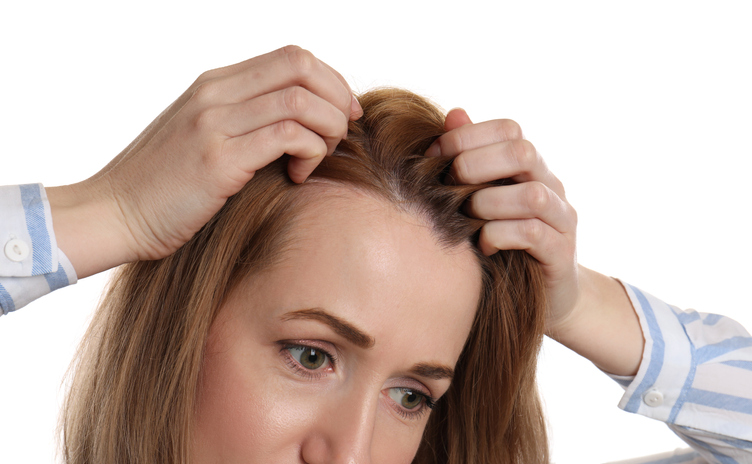Help For Menopausal Hair Loss
Many women have reported that using bioidentical natural progesterone has improved the quality of their hair, but can it actually help with hair loss?

Among the many changes of menopause that are not so welcome, many women are devastated to see the condition and quality of their hair undergoing a change.
We expect to see some grey or silver hairs, to reflect the fact we have gained so much wisdom, but we do not want to see thinning patches or in more drastic cases actual hair loss.
Why it occurs
There’s no single cause for hair loss. Triggers range from medical conditions to stress and lifestyle factors, like what you eat.
It can be a natural process of ageing, but menopause hormone changes do contribute too.
Such changes are part of the aging process but it can also be related to the Pill, thyroid disease, PCOS, some medications and conditions such as alopecia or ringworm.
Also if you tend to do a lot of crash dieting then that definitely can affect your hair as can the way that you actually style it.
There are so many styles that can affect your scalp, such as tight ponytails or plaits that can irritate your scalp and cause hair to fall out, and the same goes for using tight rollers or hair ornaments.
Hormone and lifestyle factors
When progesterone levels fall as a result of lack of ovulation, the body responds by increasing its production of the adrenal cortical steroid androstenedione. This steroid is an alternative precursor for the production of other adrenal cortical hormones.
Androstenedione conveys some male like properties, one of which unfortunately is male pattern hair loss.
There is also an everyday explanation: as we age, hair becomes a little finer and weaker, which leads to a flatness, loss of body and a greater tendency to split ends, causing a degree of frizziness.
It can also be due to the effects of hair-care treatments, dyes and styling; particularly the habit of twisting or pulling your hair up into bands which break the hair.
Your scalp is home to about 100,000 hairs and each one has its own life cycle. A follicle produces a single hair that grows at a rate of half an inch per month.
The hair remains in place for 2 to 6 years, then stops for about a month. When the next cycle starts up, that hair falls out so at any given time, most of the hairs are in the growth phase.
What you can do about it
Maintaining good progesterone levels is a priority, as when its levels rise the androstenedione level will gradually fall and normal hair growth will eventually resume.
It is not an overnight solution as hair growth can take 4-6 months for the effects to become apparent, but you can support the process by paying attention to diet and supplements.
The first key element for healthy hair is to ensure a good supply of omega-3 fatty acids. Dietary sources include salmon, sardines and herring and you should try for at least two servings a week.
If you don’t like fish then supplement with a good quality fish oil. Vegetarians, and everyone else, can also get a good source from flaxseed, which can be ground and sprinkled on cereal or salads.
The second super supplement for healthy hair is GLA (gamma-linolenic acid) and an excellent source is evening primrose oil.
Helpful information
So having good progesterone levels is clearly essential as it is low levels of that specific hormone that is indicated in hair loss.
However, don’t forget about your diet because that is also a crucial element and if you need some help than this article will provide it.
https://anna.blog.wellsprings-health.com/top-10-foods-for-healthy-hair/


















